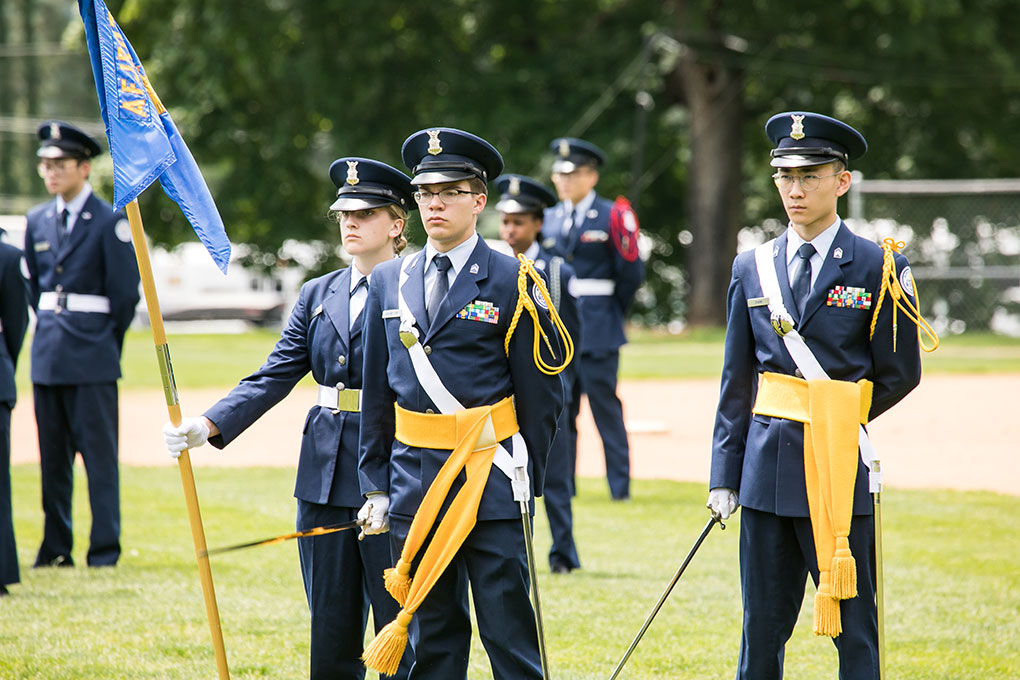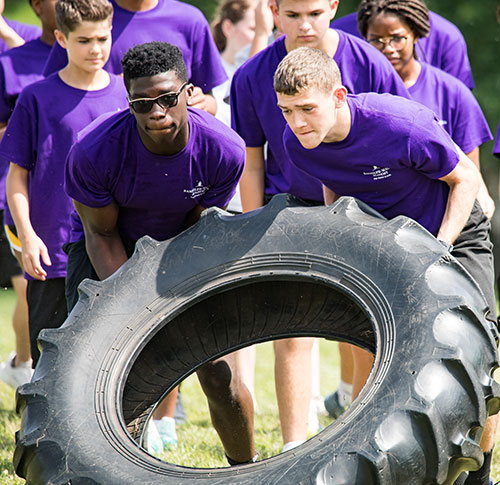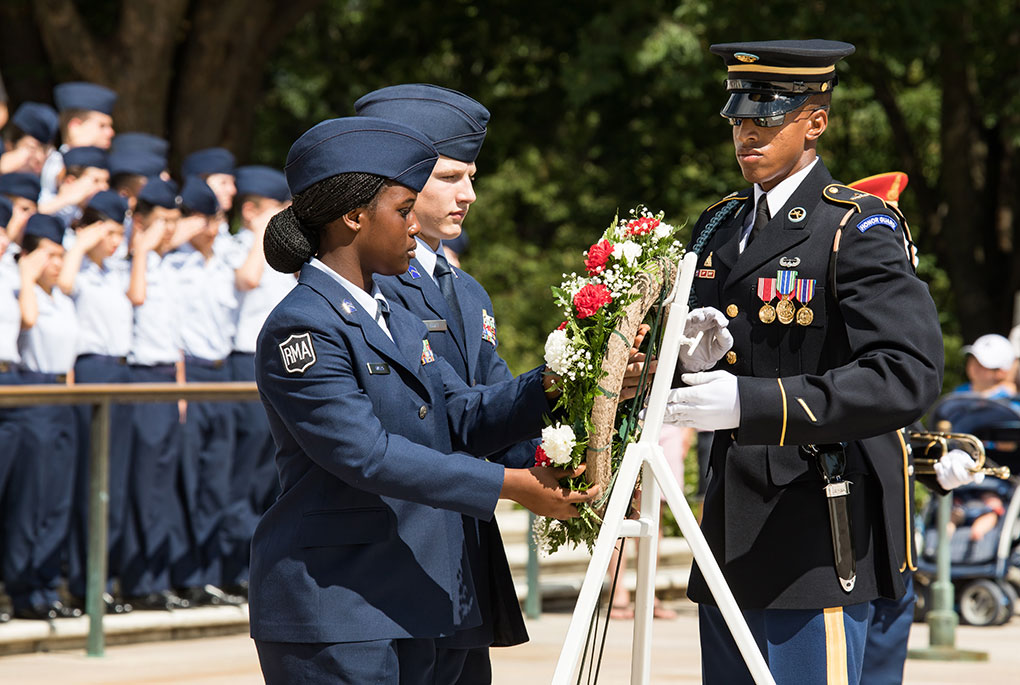As our cadre (student leaders) register today, our minds turn to leadership. The word “leadership” has become irrefutably linked with the idea of “military academy.” In large part, this is due to the excellent reputation the U.S. service academies and military colleges have for producing men and women who go on to become strong leaders in the armed forces and in society. That reputation has also extended to military high schools throughout the U.S.; indeed, most of these military schools tout some form of “creating leaders” as one of their key benefits.
Is this reputation justified? What leadership training does a military school provide that other schools do not? What leadership opportunities exist there that do not exist in a civilian boarding school, or a public school that hosts a Junior ROTC program? What benefits are there to putting teenagers into a military-based environment?
The question I posed to our Air Force Junior ROTC department, our Commandant, and our Student Life Director, was simpler than that. But their explanations, full of enthusiasm and conviction, answered all of these. In an effort to give this to you in manageable pieces, this first blog will address the leadership opportunities and training that takes place here at R-MA, which, as you probably know, is a military school, affiliated with Air Force Junior ROTC.
R-MA is first and foremost a college-prep school. That was the purpose of our founding, and it continues to guide our day-to-day focus. We chose to add a military component, the National Defense Cadet Corps, in 1917, and in 1975 we converted to Air Force Junior ROTC.
“The AFJROTC program offers several leadership opportunities; cadre, class or element leader, drill team, color guard, and saber team, to name a few,” commented TSgt Tina Laing, one of three Aerospace Instructors and the head coach of the drill team.
TSgt Laing broke out each leadership role with Air Force Junior ROTC:
- As a cadre leader, cadets are assigned several roles, providing them a responsibility in running the school. It doesn’t matter whether you are a Flight Sergeant or the Corps Commander, as each job provides a level of responsibility learning to lead either a program, a special project, or a team.
- As a class leader, cadets are given the opportunity to be in charge of taking roll, communicating to their class peers what the homework or project assignments are and when they are due, and leading the class in ensuring there is collaboration, team effort, and respect.
- Element leaders are given the opportunity to assist those within their element on how to adjust in the dorm room life, academics, uniform wear, or any other issues a cadet may be struggling in.
- Further, as a member of the drill, Color Guard, or saber team, these leaders are afforded the opportunity in leading their peers in a competition or performance, ensuring they represent themselves to the best of their abilities.
Not to be ignored, TSgt Laing noted, is the fact that even a brand-new student who is not engaged in any of these roles is learning valuable lessons. Fellow Aerospace Instructor CMSgt Matthew Lusson, USAF, Retired, P’19 agreed. “The students are taught a great deal about followership and its importance to making great leaders. One must always learn how to follow effectively before they can be expected to lead,” he said.
R-MA Director of Student Life Todd Davis, a military school graduate himself, gave a year-by-year description of what students learn. “While the academic program prepares our students for college, the military model prepares our students for life,” he said. “The program is not designed to make soldiers. It is designed to prepare our students to become successful/honorable leaders in their chosen field of work and their communities.”
“A first-year student at R-MA learns to lead themselves through time management, personal responsibility, self-discipline and a personal commitment to their assigned flight,” Mr. Davis continued. “It is the foundation in which they learn to communicate and work within a team setting. The next step in the leadership program is learning to lead others. At this level, our students learn effective communication skills, how to follow and give directives, and how to successfully lead and motivate others. The next step in the leadership program is to take on a managing position in which they learn to manage other leaders to make sure daily tasks, standards and routines are being accomplished in a timely/respectful manner. Once the student has shown success at managing others, they have the ability to move into a senior level leadership position in which they focus on daily operations and organizational change.”
While the Air Force Junior ROTC staff teaches the students the leadership skills they need in the classroom, the campus becomes the “leadership lab” for the students, and in no place is that more evident than in the dorms, where the students live according to their designated flights (teams). Having that safe environment to learn in is crucial to building skills, rather than just memorizing lessons.
“While developing these critical leadership skills at such a young age, the students are going to make mistakes,” observed CMSgt Lusson. “In an environment like R-MA, these mistakes are not held against the students forever, they are in turn used as an educational growing experience, so that once they graduate and move on to bigger and better things, they will always have these to fall back on as learning moments.”
The lessons learned and the leadership skills gained are not limited to the students’ time at military school or a military career; they are applicable to any career and even other areas of life, such as serving on nonprofit boards or coaching youth sports.
“Having the ability to lead their peers within a structured chain of command at such a young age is an education that most of us do not get until we are entering the workforce as a young professional,” Mr. Davis observed. “This gives our students the knowledge, experience and confidence needed to excel in their chosen career paths.”
The leadership opportunities within the military boarding school setting do not end with Air Force Junior ROTC or the dorm. There are sports, clubs, honor societies, class officers, and myriad other opportunities for every student to take the lessons learned into the classroom, and apply them to the organization about which they are passionate.
In our next blog, which we will post on August 14th, Commandant LtCol Michael Starling ‘88, USMC, Retired, will share some of the benefits he sees our students gain throughout their time as leaders.



